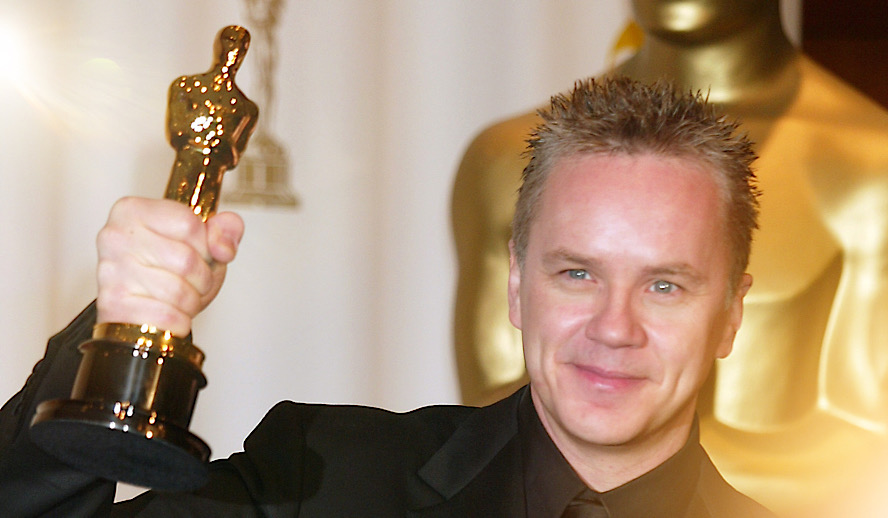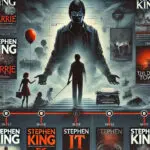Table of Contents

Video Version of this Article
Photo/Video: Tim Robbins with Oscar Award victory at the Annual Academy Awards/Featureflash Photo Agency/Shutterstock/Hollywood Insider YouTube Channel
When looking back at the most popular movies of all time, what often links them together is the ability to introduce and create generational actors that would go on to define film for decades to come. Be it Orson Welles in ‘Citizen Kane’ (1941), Al Pacino and Robert De Niro in ‘The Godfather’ Duology (1972-1974), or Leonardo DiCaprio and Kate Winslet in ‘Titanic’ (1997), more often than not the emergent stars of the largest films go on to carve out the largest careers. But while Tim Robbins has certainly avoided fading into obscurity, the star of the extraordinarily beloved top-rated film on IMDb ‘The Shawshank Redemption’ (1994), never truly rose to the same popularly celebrated heights of some of his contemporaries.
Related article: A Tribute to Cannes Film Festival: A Celebration of Cinema, Glamour, and Humanity | Statement From Hollywood Insider’s CEO Pritan Ambroase
Related article: A Tribute To George Lucas – One of the Greatest Storytellers of Our Time
Forming an instantly memorable impression in smaller bit-roles throughout the late 1980s and inspiring big-name directing talents like Adrian Lyne, Robert Altman, and Joel Coen enough to give him the chance to test his chops in starring roles, Robbins off-beat stewardship and uniquely commanding screen presence helped distinguish him from the fold and cement him as one of the most influential filmic figures of the past quarter-century. Despite boasting an immensely impressive body of work featuring roles in some of the most culturally and historically significant films of all time, Robbins has inexplicably seen both his fame and cinematic output fizzle as of late.
Tim Robbins – From Stage to Soundstage – ‘Bull Durham’ and ‘Jacob’s Ladder’
Robbins began acting on stage as a young teenager for New York’s Theater for the New City, eventually setting his sights to the silver screen and making his way to Los Angeles for college at the UCLA Film School. Much like many other young and opportunistic actors of the time, Robbins turned to the frontier landscape of network sitcom television after graduating in 1981, amassing guest appearances in shows like ‘St. Elsewhere’ (1982-1988), ‘Moonlighting’ (1985-1989), and ‘The Love Boat’ (1977-1986). Aside from a minuscule part in the cult-classic fighter pilot film ‘Top Gun’ (1986) alongside Tom Cruise, Robbins’ first real entry into Hollywood came in 1988 in the form of the baseball comedy ‘Bull Durham’.
The film saw Kevin Costner stars as a veteran MLB catcher “Crash” Davis called down to the minor league team the Durham Bulls to mentor a rowdy rookie pitcher named “Nuke” LaLoosh played by Robbins. Both men are romantically pitted against each other by a vivacious groupie played by Robbins’ later wife and frequent collaborator, Susan Sarandon. Sports Illustrated ranked the film the “#1 Greatest Sports Movie of All Time” and Robbins performance, while ultimately in support of Costner and Sarandon, was one of its most enduring characteristics.
Related article: MUST WATCH – Hollywood Insider’s CEO Pritan Ambroase’s Love Letter to Black Lives Matter – VIDEO
Subscribe to Hollywood Insider’s YouTube Channel, by clicking here.
Robbins used the momentum from this role to break into the more serious-side of acting in Adrian Lyne’s shockingly horrific nightmare ‘Jacob’s Ladder’ (1990) about a Vietnam War veteran succumbing to an intense battle with PTSD as well as something altogether more sinister. Lyne was fresh off the back of the six-Oscar nominated smash hit ‘Fatal Attraction’ starring Michael Douglas and Glenn Close and used some of the goodwill that film had amassed with the studio to greenlight the deeply upsetting caleidoscope of psychological terror and take a big swing on a relatively unknown newcomer to Hollywood in the lead role.
Rife with spiritual symbolism all the way up to its title, Jacob’s Ladder being a biblical story referring to dreams as the meeting between Heaven and Earth, the film often purposefully disorients the audience and viscerally blurs the line between hallucination and reality. This led to a somewhat tepid response from audiences citing the collective non-comfortability of the viewing experience, nonetheless, Robbins was consistently cited as an intricately detailed performer who more than carried the heavy burden the film places on his shoulders.
A Nearly Unrivaled 90s Filmography – ‘The Player’ and ‘The Shawshank Redemption’
Few actors have recorded a more prolific decade than Robbins did in the 1990s. After ‘Jacob’s Ladder’ the actor appeared in a small but memorable role in Spike Lee’s ‘Jungle Fever’ as the boss of Wesley Snipes’ character Flipper Purify. Following that film, Robbins began a string of three collaborations with the legendary maverick film director of ‘Nashville’ (1975) and ‘McCabe and Mrs. Miller’ (1971), Robert Altman. First came the release of the much-celebrated ‘The Player’ (1992), for which Robbins won a Golden Globe for Best Actor.
The film saw him take on the role of the cold and apathetic studio executive Griffin Mills as he embarks on a bitingly satirical descent into the underbelly of Hollywood and the dark side of the movies. He later teamed with Altman in the much-celebrated Los Angeles ensemble piece ‘Short Cuts’ (1993) starring Julianne Moore and Robert Downey Jr. and oft-maligned fashion show murder-mystery ‘Prêt-á-Porter’ (1994) starring Marcello Mastroianni and Sophia Loren. Robbins was again selected as a leading man by one of Hollywood’s most influential writer-director teams, Joel and Ethan Coen. The pair cast the actor as the aloof yet ambitious lead of their eccentric 1994 comedy film ‘The Hudsucker Proxy’, pitting Robbins against a villainous Paul Newman and a fast-talking Jennifer Jason Leigh.
All of these films, fascinating as they may be in their own right, were dwarfed in comparison to Robbins’ next film release, ‘The Shawshank Redemption’. The feature directorial debut from Hungarian-American director Frank Darabont, the film was a loose adaptation of legendary author Steven King’s novella “Rita Hayworth and Shawshank Redemption”. In an exceedingly contentious audition process, Robbins won the role over older Hollywood icons like Gene Hackman and Robert Duvall as well as young stars like Tom Hanks, Nicolas Cage, and Johnny Depp for the starring role of Andy Dufresne.
The film follows Dufresne’s life-sentencing at the Shawshank State Penitentiary for the murder of his wife and her lover as well as his two decades of incarceration at the prison. Dufresne befriends inmate and smuggler “Red” Redding played exceptionally by Morgan Freeman and aids the prison’s warden in a money-laundering scheme. Very few films possess even half as many iconic scenes, lines, and visuals as ‘The Shawshank Redemption’ and fewer still can reliably garner as sincere an emotional reaction as the film does from its first frame to its chillingly perfect last.
Related article: Hollywood Insider’s CEO Pritan Ambroase: “The Importance of Venice Film Festival as the Protector of Cinema”
Related article: The Masters of Cinema Archives: Hollywood Insider Pays Tribute to ‘La Vie En Rose’, Exclusive Interview with Director Olivier Dahan
Related article: – Want GUARANTEED SUCCESS? Remove these ten words from your vocabulary| Transform your life INSTANTLY
A Brief But Memorable Career in the Director’s Chair – ‘Bob Roberts’ and ‘Dead Man Walking’
In the midst of his rise in front of the camera, Robbins began an illustrious if not short-lived stint behind the camera as both a writer and director. In 1992, Robbins released his feature debut, the roarous political mockumentary ‘Bob Roberts’. The film follows Robbins as the eponymous Roberts, a popular far-right folk singer contra Bob Dylan in the midst of a vicious campaign for the Pennsylvania senate.
With a cast of Alan Rickman as Roberts’ shady campaign manager, Giancarlo Esposito as the fiercely devoted journalist bent on uncovering Robert’s demons, and Jack Black in his first-ever screen performance as a fanatical accolade of the divisively messianic politician, the film is made to appear as an actual documentary composed by a fictitiously famous documentarian given exclusive access to the Roberts campaign and the increasingly fervent events that surround it. What follows is an unquestionably audacious but unapologetically impassioned look at the debasement of the American political system that has only grown exponentially more relevant with age.
Robbins followed this film up with the even more critically and commercially successful ‘Dead Man Walking’ (1995). The film saw Robbins’ then-wife Susan Sarandon portray a spiritual advisor to Sean Penn’s death row inmate fighting for a final appeal in the days before his execution. Sarandon won the Academy Award for Best Actress for the film and Robbins received a nomination for Best Director. While Robbins did go on to direct one final film, 1999’s ‘Cradle Will Rock’, ‘Dead Man Walking’ remained the high point of directorial career and a long-lasting achievement in filmmaking.
Related article: Movies About Making Movies: A Loose Ranking of the Ten Best Movies That Peek Behind the Cinematic Curtain
Related article: George Gershwin and Cinema: A Beautiful Friendship | A Tribute
Life After Winning an Oscar- ‘Mystic River’ and Beyond
While Robbins didn’t win the Academy Award for ‘Dead Man Walking’, the actor finally got a hold of the golden statue six years later for his first and only acting nomination in Clint Eastwood’s ‘Mystic River’ (2003). Eastwood’s film surrounded a trio of lapsed childhood friends living in Boston brought back together due to a family tragedy in one of the men’s lives. Sean Penn, who also won an Academy Award for the film, portrayed the vengeful former racketeer Jimmy Markum, Kevin Bacon played the police detective investigating the heinous crime Sean Divine, and Robbins served as the sheepish Dave Boyle still tortured by a horrible incident that took place when the three were children. A decidedly bleak and surprisingly unsettling look at the corrosiveness of fractured masculinity and repressive fatalism, the film proved a smashing success and finally catapulted Robbins into the pantheon of Oscar-winners.
As can often be the case after winning an Academy Award, Robbins’ career took a turn in a very different direction. The actor began to appear in fewer films and those he did, such as Jon Favreau’s ‘Zathura: A Space Adventure’ (2005) and Martin Campbell’s disastrous ‘Green Lantern’ (2011), were often failures amongst critics and general audiences alike. Despite interesting performances in the exceptional yet underseen HBO original political series ‘The Brink’ (2015) and Todd Haynes’ legal thriller ‘Dark Waters’ (2019), the actor has taken a back seat in Hollywood in the past decade. While Robbins may not be on the same run of cinematic classics as he was before, that should not take away from the legacy of the actor nor his hard-won standings in film history.
Click here to read Hollywood Insider’s CEO Pritan Ambroase’s love letter to Black Lives Matter, in which he tackles more than just police reform, press freedom and more – click here.
An excerpt from the love letter: Hollywood Insider’s CEO/editor-in-chief Pritan Ambroase affirms, “Hollywood Insider fully supports the much-needed Black Lives Matter movement. We are actively, physically and digitally a part of this global movement. We will continue reporting on this major issue of police brutality and legal murders of Black people to hold the system accountable. We will continue reporting on this major issue with kindness and respect to all Black people, as each and every one of them are seen and heard.
Just a reminder, that the Black Lives Matter movement is about more than just police brutality and extends into banking, housing, education, medical, infrastructure, etc. We have the space and time for all your stories. We believe in peaceful/non-violent protests and I would like to request the rest of media to focus on 95% of the protests that are peaceful and working effectively with positive changes happening daily. Media has a responsibility to better the world and Hollywood Insider will continue to do so.”
Ways to support Black Lives Matter Movement to end systemic racism
More Interesting Stories From Hollywood Insider
– Want GUARANTEED SUCCESS? Remove these ten words from your vocabulary| Transform your life INSTANTLY
– Compilation: All James Bond 007 Opening Sequences From 1962 Sean Connery to Daniel Craig
– Do you know the hidden messages in ‘Call Me By Your Name’? Find out behind the scenes facts in the full commentary and In-depth analysis of the cinematic masterpiece
– A Tribute To The Academy Awards: All Best Actor/Actress Speeches From The Beginning Of Oscars 1929-2019 | From Rami Malek, Leonardo DiCaprio To Denzel Washington, Halle Berry & Beyond | From Olivia Colman, Meryl Streep To Bette Davis & Beyond
– In the 32nd Year Of His Career, Keanu Reeves’ Face Continues To Reign After Launching Movies Earning Over $4.3 Billion In Total – “John Wick”, “Toy Story 4”, “Matrix”, And Many More
tim robbins, tim robbins, tim robbins, tim robbins, tim robbins, tim robbins, tim robbins, tim robbins, tim robbins, tim robbins, tim robbins, tim robbins, tim robbins, tim robbins, tim robbins, tim robbins, tim robbins, tim robbins, tim robbins, tim robbins, tim robbins

Andrew Valianti is a writer and an aspiring producer-director, and all-around film lover. While writing both features and reviews for the Hollywood Insider, Andrew has focused on the intersection of cinema and politics as they relate to empowering diverse stories and viewpoints. Through both study and practice, Andrew has seen first hand the many ways in which film and media can have a positive and meaningful impact on everyday lives. His personal views align with the Hollywood Insider, as he views journalism as a means to empower and mobilize positive change rather than spread gossip or negativity. He believes that art ignites action and has sought to pursue stories that further this goal.








